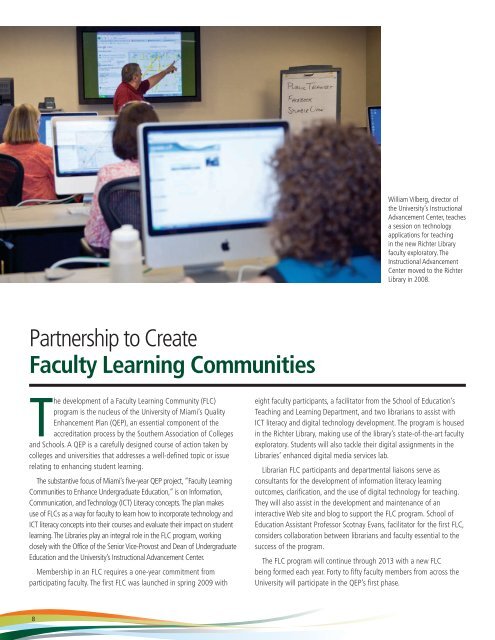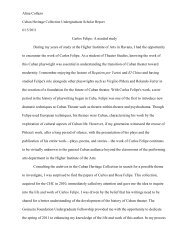Progress Report - University of Miami Libraries
Progress Report - University of Miami Libraries
Progress Report - University of Miami Libraries
Create successful ePaper yourself
Turn your PDF publications into a flip-book with our unique Google optimized e-Paper software.
Partnership to Create<br />
Faculty Learning Communities<br />
The development <strong>of</strong> a Faculty Learning Community (FLC)<br />
program is the nucleus <strong>of</strong> the <strong>University</strong> <strong>of</strong> <strong>Miami</strong>’s Quality<br />
Enhancement Plan (QEP), an essential component <strong>of</strong> the<br />
accreditation process by the Southern Association <strong>of</strong> Colleges<br />
and Schools. A QEP is a carefully designed course <strong>of</strong> action taken by<br />
colleges and universities that addresses a well-defined topic or issue<br />
relating to enhancing student learning.<br />
The substantive focus <strong>of</strong> <strong>Miami</strong>’s five-year QEP project, “Faculty Learning<br />
Communities to Enhance Undergraduate Education,” is on Information,<br />
Communication, and Technology (ICT) Literacy concepts. The plan makes<br />
use <strong>of</strong> FLCs as a way for faculty to learn how to incorporate technology and<br />
ICT literacy concepts into their courses and evaluate their impact on student<br />
learning. The <strong>Libraries</strong> play an integral role in the FLC program, working<br />
closely with the Office <strong>of</strong> the Senior Vice-Provost and Dean <strong>of</strong> Undergraduate<br />
Education and the <strong>University</strong>’s Instructional Advancement Center.<br />
Membership in an FLC requires a one-year commitment from<br />
participating faculty. The first FLC was launched in spring 2009 with<br />
8<br />
William Vilberg, director <strong>of</strong><br />
the <strong>University</strong>’s Instructional<br />
Advancement Center, teaches<br />
a session on technology<br />
applications for teaching<br />
in the new Richter Library<br />
faculty exploratory. The<br />
Instructional Advancement<br />
Center moved to the Richter<br />
Library in 2008.<br />
eight faculty participants, a facilitator from the School <strong>of</strong> Education’s<br />
Teaching and Learning Department, and two librarians to assist with<br />
ICT literacy and digital technology development. The program is housed<br />
in the Richter Library, making use <strong>of</strong> the library’s state-<strong>of</strong>-the-art faculty<br />
exploratory. Students will also tackle their digital assignments in the<br />
<strong>Libraries</strong>’ enhanced digital media services lab.<br />
Librarian FLC participants and departmental liaisons serve as<br />
consultants for the development <strong>of</strong> information literacy learning<br />
outcomes, clarification, and the use <strong>of</strong> digital technology for teaching.<br />
They will also assist in the development and maintenance <strong>of</strong> an<br />
interactive Web site and blog to support the FLC program. School <strong>of</strong><br />
Education Assistant Pr<strong>of</strong>essor Scotnay Evans, facilitator for the first FLC,<br />
considers collaboration between librarians and faculty essential to the<br />
success <strong>of</strong> the program.<br />
The FLC program will continue through 2013 with a new FLC<br />
being formed each year. Forty to fifty faculty members from across the<br />
<strong>University</strong> will participate in the QEP’s first phase.



